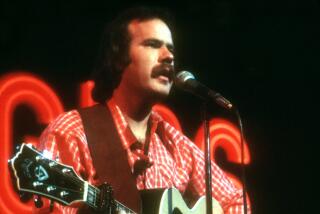O.C. POP MUSIC REVIEW : Lofgren Does It His--and His Heart’s--Way
- Share via
SAN JUAN CAPISTRANO — Maybe Nils Lofgren isn’t capable of the leaps of imagination one finds in the better songs of his early mentor, Neil Young.
Perhaps he lacks the knack of his current boss, Bruce Springsteen, for fleshing out American myths with a storyteller’s gift for creating memorable characters, settings and narrative lines.
But in stepping out on his own Monday night at the Coach House in San Juan Capistrano, this underrated rocker made it clear why he has been a prized sideman for such greats as Young and Springsteen. In a word, Lofgren has heart.
There wasn’t a moment in Lofgren’s two-hour show that sounded posed, contrived, or delivered with anything less than a full emotional commitment. His singing, reedy-sounding, yet sturdy and clear, conveyed the dreamy longing and battered determination that mark many of his songs. And Lofgren’s superb playing on both acoustic and electric guitar almost always was geared toward underscoring the feelings in his songs rather than merely demonstrating the long-obvious fact that he deserves to be ranked as one of rock’s finest six-string blazers. Only his extended electric slide guitar workout on “Cry Tough” strayed from the point.
Lofgren’s songs don’t contain the poetic grace notes or surprising perspectives found in the top echelons of pop songwriting. He admits as much in “I Came to Dance,” one of the 27 songs he played at the Coach House: “I’m not Bob Dylan, but I never miss a beat / I ain’t no philosopher, I dance in the street.”
But if Lofgren lacks the eloquence of a Dylan, he is far more than a simple-minded song-and-dance man. His themes may be familiar, and the expression he gives them may be basic and conventional. But that quality of heart shines through in his performance and makes his songs anything but trite, while his ability to come up with good melodies always keeps them listenable.
Lofgren, 38, sang about absorbing bruises in romance or career, and keeping hopes and ideals alive despite the setbacks. That Springsteenian watchword dreams (as in hold-onto-your) kept cropping up. But Lofgren wasn’t just mouthing platitudes. He really does sound like a dreamer, or a hurt-but-hopeful idealist unwilling to surrender his innocence because of unhappy experience.
Still, Lofgren’s best songs were the ones that grounded his ideas and emotions in specific, situations: among them were “Keith Don’t Go,” his urgent tribute to Rolling Stone Keith Richards, and “No Mercy,” in which a boxing match sets the stage for a parable about ambition’s cruel demands. When the songs were less focused, a sense of sameness--though never dullness--tended to set in.
Lofgren played most of the show in a stripped-down trio format that allowed him to connect steadily with a half-filled house of partisan fans who made up in appreciativeness what they lacked in numbers. His younger brother, Tom, and Larry Cragg provided understated keyboards and acoustic guitar accompaniment. Ballads predominated, but even without a rhythm section, Lofgren was able to rock convincingly and play some searing electric lead guitar.
Two pretty new songs played back-to-back in an opening solo acoustic sequence had nearly matching titles--”Day by Day” and “Live Each Day”--and reflected a matured perspective. The songs focused on the realization that scaling down the great expectations of youth can lead to greater fulfillment in maturity: “The only person I can change is me / What a load off my mind,” Lofgren sang in “Day by Day.”
Another of the new songs that Lofgren, currently without a record deal, hopes to release soon was “I’ll Arise,” a characteristically simple but touching statement of appreciation for his immigrant grandmother and the foundation she laid for his own aspirations. Lofgren placed “I’ll Arise” between “The Sun Hasn’t Set on This Boy Yet,” his account of his career beginnings, and Carole King’s “Goin’ Back,” a lovely song about recovering youthful ideals. Together, they formed a fine troika of songs about finding strength in one’s origins.
Somewhat surprisingly, Lofgren led off his encore with a Springsteen number. Tellingly, it was “Man at the Top,” a song about how every person wants deep down to be the boss, the “man at the top.” Although Lofgren’s own 12-album career goes back to 1971, predating Springsteen’s, he never has been a star, and he is far better known now for his sidekick role in Springsteen’s E Street Band. A singer in Lofgren’s shoes might well have put an embittered spin on “Man at the Top.” Instead, he sang with a feeling of sad yearning. In a song about unfulfilled ambition that must have hit close to home, Lofgren chose to dignify the dream, rather than deride the result.
More to Read
The biggest entertainment stories
Get our big stories about Hollywood, film, television, music, arts, culture and more right in your inbox as soon as they publish.
You may occasionally receive promotional content from the Los Angeles Times.











